七年级英语下册知识导学RevisionmoduleB词句精讲精练新版外研
七年级英语下册知识导学RevisionmoduleA词句精讲精练新版外研版
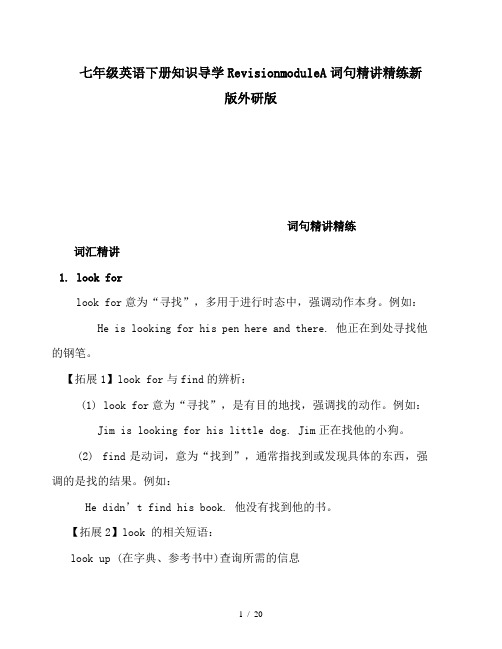
七年级英语下册知识导学RevisionmoduleA词句精讲精练新
版外研版
词句精讲精练词汇精讲
1. look for
look for意为“寻找”,多用于进行时态中,强调动作本身。
例如: He is looking for his pen here and there. 他正在到处寻找他的钢笔。
【拓展1】look for与find的辨析:
(1) look for意为“寻找”,是有目的地找,强调找的动作。
例如:
Jim is looking for his little dog. Jim正在找他的小狗。
(2) find是动词,意为“找到”,通常指找到或发现具体的东西,强调的是找的结果。
例如:
He didn’t find his book. 他没有找到他的书。
【拓展2】look 的相关短语:
look up (在字典、参考书中)查询所需的信息
1 / 20。
七年级英语Revision Module B外研社知识精讲

七年级英语Revision Module B外研社【同步教育信息】一. 本周教学内容:Revision Module B二. 重点、难点语言知识详解三. 具体内容:1. take的用法(1)作动词“带出,带领”讲。
eg.Take an umbrella with you.把雨伞带去。
They took the man to the hospital at once.他们立刻把那人送往医院。
(2)作动词“花费;占用”讲。
eg.The work took us a week to finish.我们花了一星期完成这项工作。
(3)作动词“记录;拍摄”讲。
eg.The student likes taking notes.这学生喜欢做笔记。
I took a lot of photos of my grandmother .我拍了好多张奶奶的照片。
(4)作动词“吃;喝;服(药等)”讲。
eg.Will you take a cup of tea?你要杯茶吗?Please take this medicine three times a day.这种药请一天吃三次。
(5)作动词“乘;搭(车,船等)”讲。
eg.Every day he takes a bus to work.他每天乘公共汽车去上班。
(6)作动词“就(座,职)”讲。
eg.Take a seat, please.请坐。
The president took office yesterday.昨天总统就职了。
2. 动词have 的用法(1)作“经历;遭受”讲。
eg.Did you have a good holiday?你假期过得愉快吗?We had a nice time in Xi’an.我们在西安过得很愉快。
(2)作“有;具有”讲。
eg.She has a new watch.她有一块新手表。
Do you have a computer?你有电脑吗?(3)作“吃;饮”讲。
七年级英语下册 Revision课件(新版)外研版

( B ) 5.Was your first teacher strict ? A.Yes, she wasn’t . B. No ,she
wasn’t .
B C. No, she was. ( ) 6.—— What were your friends like ?
5.Obama(奥巴马) is the p________ of US.
bored
lake
resident
C( )1. My father__ill yesterday.
A. isn't B. aren't C. wasn't
下册
Revision课 件〔新版〕 外研版
C( ) 2. __your parents at home last week﹖
6.One day I’ll go back ,and I’m looking forward to seeing my friends again.
7.Betty was born in a small town.
8.He was born on 18th July.
四、重点语法
be动词一般过去时的用法 肯定句 主语+was/were+其他 否认句 主语+was/were+not+其他
形容词:dark lost little hungry right asleep
七年级英语下册
1.once upoRn aetimveis从i前on课11.件hur〔ry to新wards 急忙去
版〕外研版 2. go for a walk 散步
12.enter the house 进入房
外研英语七年级下册Revision module B(共23张PPT)

I studied in Zhaoben Primary School. 5. Did you ride a bike to school
when you were eight? No, I didn’t.
Who did you play with at the age of ten? 7. what games/play?
What games did you play ? 8. why / like /this game? Why did you like this game?
2. Work in pairs. Ask and answer the questions in Activity 1.
1
2
3
4
5
6
pick leave bring
picked left
brought
make like begin
made liked began
hurry buy take
hurried bought
took
swim win arrive
swam won
arrived
know stop find
Listening and speaking 11. Listen and choose the correct answer. 1. Tony went to London / Hong Kong.
2. It took four / five hours to get there. 3. Tony’s uncle / aunt met them at the
What school did you go to when you were seven? 5. ride / a bike / to school / when you were eight?
初一英语(外研版)Revision Module B
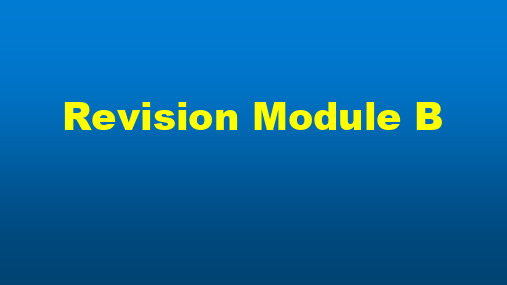
Present Continuous — Form
(疑问句) Am/Is/Are + 主语 + present participle + 宾语?
Present Continuous 疑问句
Am I
drinking juice?
Are you
drinking juice?
Is
he / she drinking juice?
4. Are people in Moscow going to work now? 5. Are people in New York having lunch now? 6. Is your cousin going to bed now? 7. Are you doing your homework?
(肯定句) 主语 + verb + 宾语. I speak Chinese.
(否定句) 主语 + do + not (don’t) + verb + 宾语. They don’t speak Chinese.
(疑问句) Do + 主语 + verb + 宾语? Do you speak Chinese?
Revision Module B
Do you remember this animal?
Does the tiger live in Asia? Yes, it does. What does the tiger eat? It eats meat.
Present Simple — Forms
Present Continuous
肯定句
I
am
You
are
初中英语外研版七年级下册《Revision_Module_B》课件

Today we went to Tower Bridge on the River Thamesand (8)l_oo_ked at the city. It’s very big! This afternoon we (9) _d_id____ some shopping. Jenny didn’t buy anything, but I (10 ) _b_o_u_g_h_t__ a present for you and I posted it just now. I hope you’ll like it! Say hello to your mum and dad.Emma
He (8) _r_o_d_e__( ride) his bike to school andhe (9) _t_ra_v_e_l_e_d_(travel) by train when hewent on holiday. He often (10) _h_a_d__( go)to the sea and (11) w__e_n_t__(swim) in the sea. He (12) _s_w_a_m_(have) a camera, but it (13) w__as_n__’t(not be ) a modern camera and he (14) _d_id_n_’_t_ta_k_e_( not take) colour photos.
3. They live a happy life today! ___W_h_a_t a__ha_p_p_y__ life they live today!
4. It was wonderful music. _W_h_a_t w_o_n_d_e_rf_ul_m_u_s_ic____ it was!
外研(新标准)版七年级下Revision module B 教学课件 (共22张PPT)

Seventy years ago, when my grandpa was young, life
was very different. Grandpa _li_st_e_n_e_d__ (listen) to music but he d_i_d_n_’_t_w_a_t_c_h_ (not watch) TV. He _p_la_y_e_d_ (play) the piano but he _d_i_d_n_’_t _p_la_y__ (not play)
Hans Christian Andersen was a famous writer of stories for children. He w__a_s_b_o_r_n_ into a poor family in Denmark in 1805. His father __d_ie_d___ when the boy was eleven. Hans _t_r_ie_d_ a few jobs. Finally, at the age of 14, he _m_o_v_e_d_ to the capital of Denmark to work in the theatre. Then he __w_e_n_t__ on to study
sister. 8 I played computer games./ He played board games. 9 Because it’s very safe./ Because it’s very exciting. 10 I liked table tennis and swimming./ He liked
外研(新标准)版七年级下Revision module B 教学课件 (共22张PPT)

3 Write your and your partner’s answers on your questionnaire. Possible answers
1 I was born in September./ He was born in April.
10 Complete the email with the correct form of the words from the box. You can use some of the words twice.
arrive buy come do go have look take visit
1 when/born? 2 where/born? 3 when/start school? 4 what school/go to when you were seven? 5 ride /a bike/ to school/ when you were eight? 6 how /go to school/ when you were eight? 7 who /play/ with? 8 what games/ play? 9 why /like/ this game? 10 what sports/ like?
No talking. No running. No photos. No swimming.
Now explain these signs with don’t.
Don’t swim. Don’t talk. Don’t take photos.
Don’t run.
7 Rewrite the sentences with what.
2024七年级英语下册RevisionmoduleBReview课件新版外研版
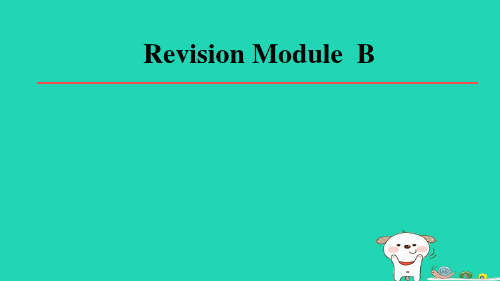
课文呈现
be born become come die find go like move read travel try write
10. What sports did you like? because ...
because . . .
10. I liked. . .
10. . . . liked. . .
课文呈现
2. Work in pairs. Ask and answer the questions in Activity 1.
课文呈现
5. Complete the passage with the correct form of the words. Seventy years ago, when my grandpa was young, life was
very different. Gten) to music but he (2) didn't watch (not watch) TV. He(3) played (play)the piano but he (4) didn't play (not play) computer games. He (5) had . (have) a telephone, but of course he (6)didn't send (not send) emails. His family (7) didn't have (not have)a car.
七年级英语下册知识导学RevisionmoduleA词句精讲精练新版外研版
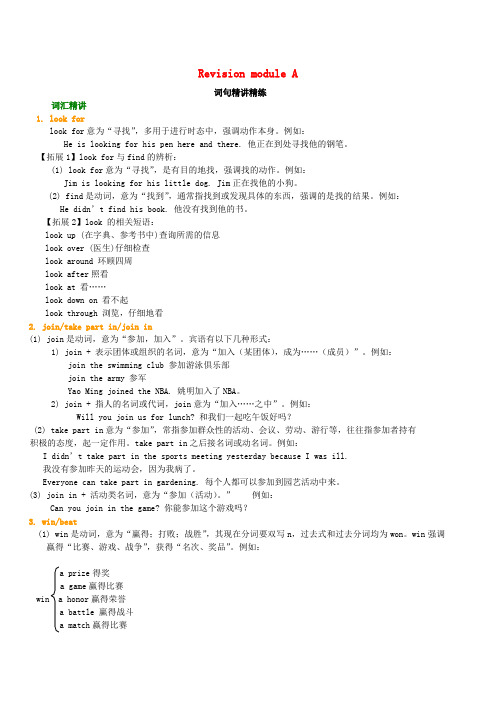
Revision module A词句精讲精练词汇精讲1. look forlook for意为“寻找”,多用于进行时态中,强调动作本身。
例如:He is looking for his pen here and there. 他正在到处寻找他的钢笔。
【拓展1】look for与find的辨析:(1) look for意为“寻找”,是有目的地找,强调找的动作。
例如:Jim is looking for his little dog. Jim正在找他的小狗。
(2) find是动词,意为“找到”,通常指找到或发现具体的东西,强调的是找的结果。
例如:He didn’t find his book. 他没有找到他的书。
【拓展2】look 的相关短语:look up (在字典、参考书中)查询所需的信息look over (医生)仔细检查look around 环顾四周look after照看look at 看……look down on 看不起look through 浏览,仔细地看2. join/take part in/join in(1) join是动词,意为“参加,加入”。
宾语有以下几种形式:1) join + 表示团体或组织的名词,意为“加入(某团体),成为……(成员)”。
例如:join the swimming club 参加游泳俱乐部join the army 参军Yao Ming joined the NBA. 姚明加入了NBA。
2) join + 指人的名词或代词,join意为“加入……之中”。
例如:Will you join us for lunch? 和我们一起吃午饭好吗?(2) take part in意为“参加”,常指参加群众性的活动、会议、劳动、游行等,往往指参加者持有积极的态度,起一定作用。
take part in之后接名词或动名词。
例如:I didn’t take part in the sports meeting yesterday because I was ill.我没有参加昨天的运动会,因为我病了。
外研版七年级下册英语RevisionModuleB

2 Our music teacher can play__m_o_d__er_n__ as well as traditional music.
3 We like pop music because it’s good __fu__n__. 4 Opera is a kind of play with_m__u_s_i_c___. 5 This song is really _b_e_a_u_t_i_fu_l__. I like it a lot. 6 This music makes me feel _s_a_d____.
1 It is a nice present. __W__h_at_a___ nice present it is!
2 It’s a fine day today. _W__h_a_t_a_f_in_e_d_a_y_ it is today!
3 They live a happy life today. _W__h_at_a__h_a_p_p_y_ life they live today!
祈使句
• 祈使句一般没有主语,说话的对象都是 第二人称“你”或“你们” ,所以也可
以理 解为省略了主语you;
• 以动词原形开头,无时态和数的变化; • 祈使句的否定形式是在动词原形前加
don’t; • 在表达请求时,可以加please;表达比较
强烈的语气时,可以用感叹号。
6 Match the pictures with their meaning.
football and running.
4 Complete the passage with the correct form of the words and expressions from the box.
七年级英语下册知识导学RevisionmoduleB词句精讲精练新版外研版
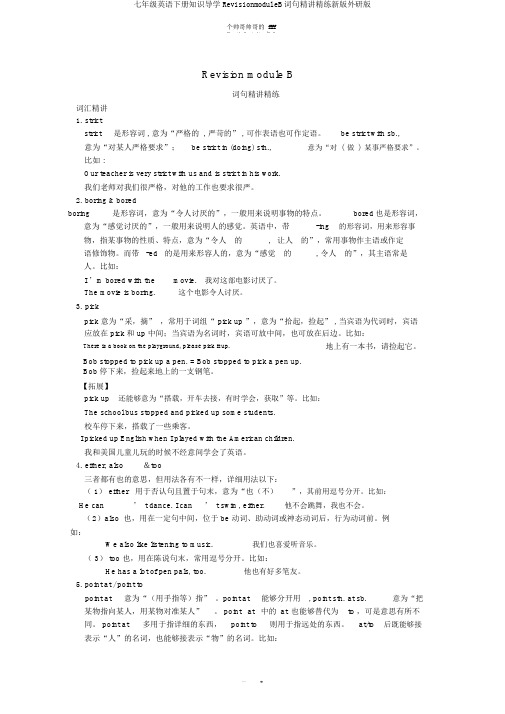
个帅哥帅哥的 ffffRevision module B词句精讲精练词汇精讲 1. strictstrict 是形容词 , 意为“严格的 , 严苛的” , 可作表语也可作定语。
be strict with sb.,意为“对某人严格要求”; be strict in (doing) sth.,意为“对 ( 做 ) 某事严格要求”。
比如 :Our teacher is very strict with us and is strict in his work. 我们老师对我们很严格,对他的工作也要求很严。
2. boring & bored boring是形容词,意为“令人讨厌的”,一般用来说明事物的特点。
bored 也是形容词,意为“感觉讨厌的”,一般用来说明人的感觉。
英语中,带 -ing的形容词,用来形容事物,指某事物的性质、特点,意为“令人 的 , 让人 的”,常用事物作主语或作定语修饰物。
而带 -ed 的是用来形容人的,意为“感觉 的, 令人 的”,其主语常是人。
比如:I ’m bored with the movie. 我对这部电影讨厌了。
The movie is boring. 这个电影令人讨厌。
3. pickpick 意为“采,摘” ,常用于词组“ pick up ”,意为“拾起,捡起” , 当宾语为代词时,宾语应放在 pick 和 up 中间;当宾语为名词时,宾语可放中间,也可放在后边。
比如:地上有一本书,请捡起它。
【拓展】pick up 还能够意为“搭载,开车去接,有时学会,获取”等。
比如: The school bus stopped and picked up some students. 校车停下来,搭载了一些乘客。
I picked up English when I played with the American children. 我和美国儿童儿玩的时候不经意间学会了英语。
[配套k12学习]七年级英语下册知识导学RevisionmoduleA词句精讲精练新版外研版
![[配套k12学习]七年级英语下册知识导学RevisionmoduleA词句精讲精练新版外研版](https://img.taocdn.com/s3/m/ecaa8199d1f34693daef3e72.png)
Revision module A词句精讲精练词汇精讲1. look forlook for意为“寻找”,多用于进行时态中,强调动作本身。
例如:He is looking for his pen here and there. 他正在到处寻找他的钢笔。
【拓展1】look for与find的辨析:(1) look for意为“寻找”,是有目的地找,强调找的动作。
例如:Jim is looking for his little dog. Jim正在找他的小狗。
(2) find是动词,意为“找到”,通常指找到或发现具体的东西,强调的是找的结果。
例如:He didn’t find his book. 他没有找到他的书。
【拓展2】look 的相关短语:look up (在字典、参考书中)查询所需的信息look over (医生)仔细检查look around 环顾四周look after照看look at 看……look down on 看不起look through 浏览,仔细地看2. join/take part in/join in(1) join是动词,意为“参加,加入”。
宾语有以下几种形式:1) join + 表示团体或组织的名词,意为“加入(某团体),成为……(成员)”。
例如:join the swimming club 参加游泳俱乐部join the army 参军Yao Ming joined the NBA. 姚明加入了NBA。
2) join + 指人的名词或代词,join意为“加入……之中”。
例如:Will you join us for lunch? 和我们一起吃午饭好吗?(2) take part in意为“参加”,常指参加群众性的活动、会议、劳动、游行等,往往指参加者持有积极的态度,起一定作用。
take part in之后接名词或动名词。
例如:I didn’t take part in the sports meeting yesterday because I was ill.我没有参加昨天的运动会,因为我病了。
七年级英语下册知识导学RevisionmoduleA词句精讲精练新版外研版
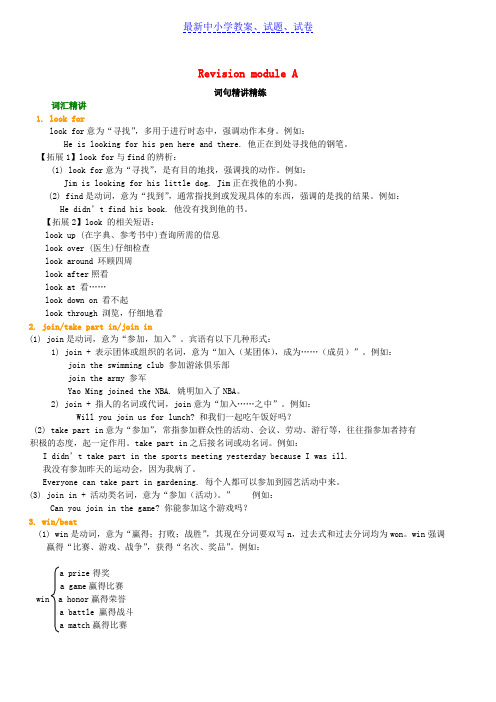
Revision module A词句精讲精练词汇精讲1. look forlook for意为“寻找”,多用于进行时态中,强调动作本身。
例如:He is looking for his pen here and there. 他正在到处寻找他的钢笔。
【拓展1】look for与find的辨析:(1) look for意为“寻找”,是有目的地找,强调找的动作。
例如:Jim is looking for his little dog. Jim正在找他的小狗。
(2) find是动词,意为“找到”,通常指找到或发现具体的东西,强调的是找的结果。
例如:He didn’t find his book. 他没有找到他的书。
【拓展2】look 的相关短语:look up (在字典、参考书中)查询所需的信息look over (医生)仔细检查look around 环顾四周look after照看look at 看……look down on 看不起look through 浏览,仔细地看2. join/take part in/join in(1) join是动词,意为“参加,加入”。
宾语有以下几种形式:1) join + 表示团体或组织的名词,意为“加入(某团体),成为……(成员)”。
例如:join the swimming club 参加游泳俱乐部join the army 参军Yao Ming joined the NBA. 姚明加入了NBA。
2) join + 指人的名词或代词,join意为“加入……之中”。
例如:Will you join us for lunch? 和我们一起吃午饭好吗?(2) take part in意为“参加”,常指参加群众性的活动、会议、劳动、游行等,往往指参加者持有积极的态度,起一定作用。
take part in之后接名词或动名词。
例如:I didn’t take part in the sports meeting yesterday because I was ill.我没有参加昨天的运动会,因为我病了。
七年级英语下册知识导学RevisionmoduleA词句精讲精练新版外研版
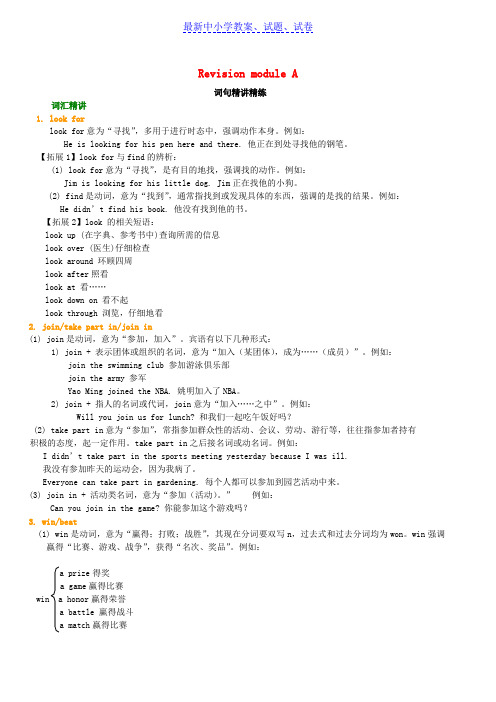
Revision module A词句精讲精练词汇精讲1. look forlook for意为“寻找”,多用于进行时态中,强调动作本身。
例如:He is looking for his pen here and there. 他正在到处寻找他的钢笔。
【拓展1】look for与find的辨析:(1) look for意为“寻找”,是有目的地找,强调找的动作。
例如:Jim is looking for his little dog. Jim正在找他的小狗。
(2) find是动词,意为“找到”,通常指找到或发现具体的东西,强调的是找的结果。
例如:He didn’t find his book. 他没有找到他的书。
【拓展2】look 的相关短语:look up (在字典、参考书中)查询所需的信息look over (医生)仔细检查look around 环顾四周look after照看look at 看……look down on 看不起look through 浏览,仔细地看2. join/take part in/join in(1) join是动词,意为“参加,加入”。
宾语有以下几种形式:1) join + 表示团体或组织的名词,意为“加入(某团体),成为……(成员)”。
例如:join the swimming club 参加游泳俱乐部join the army 参军Yao Ming joined the NBA. 姚明加入了NBA。
2) join + 指人的名词或代词,join意为“加入……之中”。
例如:Will you join us for lunch? 和我们一起吃午饭好吗?(2) take part in意为“参加”,常指参加群众性的活动、会议、劳动、游行等,往往指参加者持有积极的态度,起一定作用。
take part in之后接名词或动名词。
例如:I didn’t take part in the sports meeting yesterday because I was ill.我没有参加昨天的运动会,因为我病了。
七年级英语下册知识导学RevisionmoduleA词句精讲精练新版外研版

Revision module A词句精讲精练词汇精讲1. look forlook for意为“寻找”,多用于进行时态中,强调动作本身。
例如:He is looking for his pen here and there. 他正在到处寻找他的钢笔。
【拓展1】look for与find的辨析:(1) look for意为“寻找”,是有目的地找,强调找的动作。
例如:Jim is looking for his little dog. Jim正在找他的小狗。
(2) find是动词,意为“找到”,通常指找到或发现具体的东西,强调的是找的结果。
例如:He didn’t find his book. 他没有找到他的书。
【拓展2】look 的相关短语:look up (在字典、参考书中)查询所需的信息look over (医生)仔细检查look around 环顾四周look after照看look at 看……look down on 看不起look through 浏览,仔细地看2. join/take part in/join in(1) join是动词,意为“参加,加入”。
宾语有以下几种形式:1) join + 表示团体或组织的名词,意为“加入(某团体),成为……(成员)”。
例如:join the swimming club 参加游泳俱乐部join the army 参军Yao Ming joined the NBA. 姚明加入了NBA。
2) join + 指人的名词或代词,join意为“加入……之中”。
例如:Will you join us for lunch? 和我们一起吃午饭好吗?(2) take part in意为“参加”,常指参加群众性的活动、会议、劳动、游行等,往往指参加者持有积极的态度,起一定作用。
take part in之后接名词或动名词。
例如:I didn’t take part in the sports meeting yesterday because I was ill.我没有参加昨天的运动会,因为我病了。
[k12精品]七年级英语下册知识导学RevisionmoduleA词句精讲精练新版外研版
![[k12精品]七年级英语下册知识导学RevisionmoduleA词句精讲精练新版外研版](https://img.taocdn.com/s3/m/2983367e852458fb770b5682.png)
Revision module A词句精讲精练词汇精讲1. look forlook for意为“寻找”,多用于进行时态中,强调动作本身。
例如:He is looking for his pen here and there. 他正在到处寻找他的钢笔。
【拓展1】look for与find的辨析:(1) look for意为“寻找”,是有目的地找,强调找的动作。
例如:Jim is looking for his little dog. Jim正在找他的小狗。
(2) find是动词,意为“找到”,通常指找到或发现具体的东西,强调的是找的结果。
例如:He didn’t find his book. 他没有找到他的书。
【拓展2】look 的相关短语:look up (在字典、参考书中)查询所需的信息look over (医生)仔细检查look around 环顾四周look after照看look at 看……look down on 看不起look through 浏览,仔细地看2. join/take part in/join in(1) join是动词,意为“参加,加入”。
宾语有以下几种形式:1) join + 表示团体或组织的名词,意为“加入(某团体),成为……(成员)”。
例如:join the swimming club 参加游泳俱乐部join the army 参军Yao Ming joined the NBA. 姚明加入了NBA。
2) join + 指人的名词或代词,join意为“加入……之中”。
例如:Will you join us for lunch? 和我们一起吃午饭好吗?(2) take part in意为“参加”,常指参加群众性的活动、会议、劳动、游行等,往往指参加者持有积极的态度,起一定作用。
take part in之后接名词或动名词。
例如:I didn’t take part in the sports meeting yesterday because I was ill.我没有参加昨天的运动会,因为我病了。
- 1、下载文档前请自行甄别文档内容的完整性,平台不提供额外的编辑、内容补充、找答案等附加服务。
- 2、"仅部分预览"的文档,不可在线预览部分如存在完整性等问题,可反馈申请退款(可完整预览的文档不适用该条件!)。
- 3、如文档侵犯您的权益,请联系客服反馈,我们会尽快为您处理(人工客服工作时间:9:00-18:30)。
Revision module B词句精讲精练词汇精讲1。
strictstrict是形容词,意为“严格的,严厉的”,可作表语也可作定语。
be strict with sb。
,意为“对某人严格要求”;be strict in (doing) sth。
, 意为“对(做)某事严格要求”。
例如:Our teacher is very strict with us and is strict in his work。
我们老师对我们很严格,对他的工作也要求很严。
2。
boring & boredboring是形容词,意为“令人厌烦的”,一般用来说明事物的特征。
bored也是形容词,意为“感到厌烦的”,一般用来说明人的感受。
英语中,带-ing的形容词,用来形容事物,指某事物的性质、特征,意为“令人……的, 让人……的”,常用事物作主语或作定语修饰物。
而带-ed的是用来形容人的,意为“感到……的,使人……的”,其主语常是人。
例如:I’m bored with the movie。
我对这部电影厌烦了。
The movie is boring。
这个电影令人厌烦。
3。
pickpick意为“采,摘”,常用于词组“pick up”,意为“拾起,捡起”, 当宾语为代词时,宾语应放在pick和up中间;当宾语为名词时,宾语可放中间,也可放在后面。
例如:There is a book on the playground, please pick it up。
地上有一本书,请捡起它。
Bob stopped to pick up a pen。
= Bob stopped to pick a pen up。
Bob停下来,捡起来地上的一支钢笔。
【拓展】pick up还可以意为“搭载,开车去接,偶然学会,获得”等。
例如:The school bus stopped and picked up some students。
校车停下来,搭载了一些乘客。
I picked up English when I played with the American children。
我和美国小孩儿玩的时候不经意间学会了英语。
4。
either, also&too三者都有也的意思,但用法各有不同,具体用法如下:(1)either用于否定句且置于句末,意为“也(不)”,其前用逗号隔开。
例如:He can’t dance。
I can’t swim, either。
他不会跳舞,我也不会。
(2)also也,用在肯定句中间,位于be动词、助动词或情态动词后,行为动词前。
例如:We also like listening to music。
我们也喜欢听音乐。
(3)too也,用在陈述句末,常用逗号隔开。
例如:He has a lot of pen pals, too。
他也有很多笔友。
5。
point at / point topoint at 意为“(用手指等)指”。
point at 可以分开用, point sth。
at sb。
意为“把某物指向某人,用某物瞄准某人”。
point at 中的at也可以替换为to,但是意思有所不同。
point at 多用于指具体的东西,point to则用于指远处的东西。
at/to后既可以接表示“人”的名词,也可以接表示“物”的名词。
例如:The guide pointed to the mountain in distance。
导游指着远处的一座山。
Don’t point at me! 不要指着我!6。
as well asas well as意为“也,还有,而且”,用来连接两个并列的相同成分,如名词、形容词、动词或介词,通常不位于句首。
as well as连接的虽然是两个并列成分,但强调重点在前面,不在后面,因此它在连接主语时,谓语动词在人称和数上与前一项保持一致。
例如:Living things need air and sunlight as well as water。
生物不仅需要水,还需要空气和阳光。
The apples,as well as the milk,are in the fridge。
苹果,还有牛奶,都在冰箱里。
7。
such as&for examplesuch as意为“例如”,用来罗列同类人或物中的几个例子,可置于被列举的事物与前面的名词之间,但such as后边不能用逗号。
for example也意为“例如”,但是强调“举例”说明,而且一般只举同类人或物中的一个作为插入语,且用逗号隔开。
for example可置于句首、句中或句末。
例如:English is spoken in many countries, such as Australia, Canada and so on。
许多国家说英语,如澳大利亚、加拿大等。
Many students like playing computer games,for example,Mike。
许多学生喜欢玩电脑游戏,比如迈克。
8。
laugh&smile(1)laugh是一个动词,意为“大笑”,指哈哈大笑或者出声的笑,常伴有动作,表示高兴、快乐、嘲笑等。
例如:At that moment, everyone began laugh and sing。
那时大家开始又唱又笑。
(2)smile意为“微笑”,指无声的笑,重在笑容,表示愉快、亲切、友好等。
例如:The man smiled and immediately went out。
那人微微一笑便出去了。
9。
lively,alive,live&living这四个词都可用作形容词,异同点如下:(1)lively常用作定语或表语,“充满活力的,活泼的,有生气的”。
例如:What a lively girl she is! 多么活泼的一个女孩儿啊!(2)alive常作表语或后置定语,“有生命的,活的”。
例如:The bird is still alive。
那只鸟还活着。
(3)live作定语,“活的,有生命的(主要用来指鸟或其他动物);现场的,直播的”。
例如:Look! These is a live fish in the pool。
看!池子里有一条活鱼。
(4)living意为“活的,健在的”。
例如:Is the old man still living? 那老人还健在吗?10。
hear sb。
do sth。
hear sb。
do sth。
表示“听到某人经常做某事或做某事的全过程(已完成)”,hear sb。
doing sth。
表示“听到某人正在做某事(正在进行)”。
例如:I usually hear someone sing in her room。
我经常听到有人在房间里唱歌。
【拓展】(1)hear of意为“听说”,后面接名词,代词或动名词。
例如:I have never heard of him。
我从来没有听说过他。
(2)hear from sb。
意为“收到某人的来信”,与receive a letter from sb。
意思相同。
例如:I heard from my mother yesterday。
= I received a letter from my mother yesterday。
昨天我收到了妈妈的来信。
11。
sound, noise &voice(1)sound这个词的使用范围很大,大自然的任何“声音”都可以用sound来表示。
例如:At midnight he heard a strange sound。
半夜里他听到一种奇怪的声音。
(2)voice一般指人的声音,说话、唱歌等人发出的声响都可以用voice表示。
例如:My mother has beautiful voice。
我妈妈有很美的嗓音。
(3)noise意为“噪音”,专指人们不喜欢或者不愿意听到的声音。
它的形容词是noisy,意为“吵闹的”。
例如:Don’t make so much noise! 别这么吵闹!12。
make sb。
+ adj。
make作使役动词,意为“使……;让……”讲时,常构成make + 宾语(sb。
/sth。
) + 形容词/名词(作宾补),即make sb。
/ sth。
+ adj。
/n。
例如:The news made us exciting。
这个消息让我们兴奋。
【拓展】make作使役动词,还可后接省略to的动词不定式,即:make sb。
do sth。
意为“使/让某人做某事”,类似的动词还有let,have等。
例如:The boss made them work for long time。
老板让他们长时间工作。
They made us forget the time。
他们使我们忘记了时间。
词汇精练I。
汉译英。
1。
在一个小村庄________ 2。
对某人很友好_______ 3。
迷路_______4。
向四周看________ 5。
在……末尾________ 6。
……的首都_______II。
根据句意及首字母提示补全单词。
1。
We are s______ with ourselves。
2。
I don’t like the movie because it’s very b______。
3。
My mother is cooking in the k_____ now。
4。
Xu Li with his friends p______ waste paper in the park every Sunday。
5。
The teacher p_____ at the map and told us where the USA is。
6。
I don’t like the music and my brother doesn’t like it, e_______。
7。
She had a warm s_____ on her face。
8。
My mother likes to listen to Beijing O_____。
9。
Do you like r_____ music?10。
There are many m______ machines in the big factory。
III。
用所给单词的适当形式填空。
1。
The little girl looks forward to ______ (play) with snow。
2。
One day man may ______ (live) on the moon。
3。
We have three ________ (dictionary) in the case。
